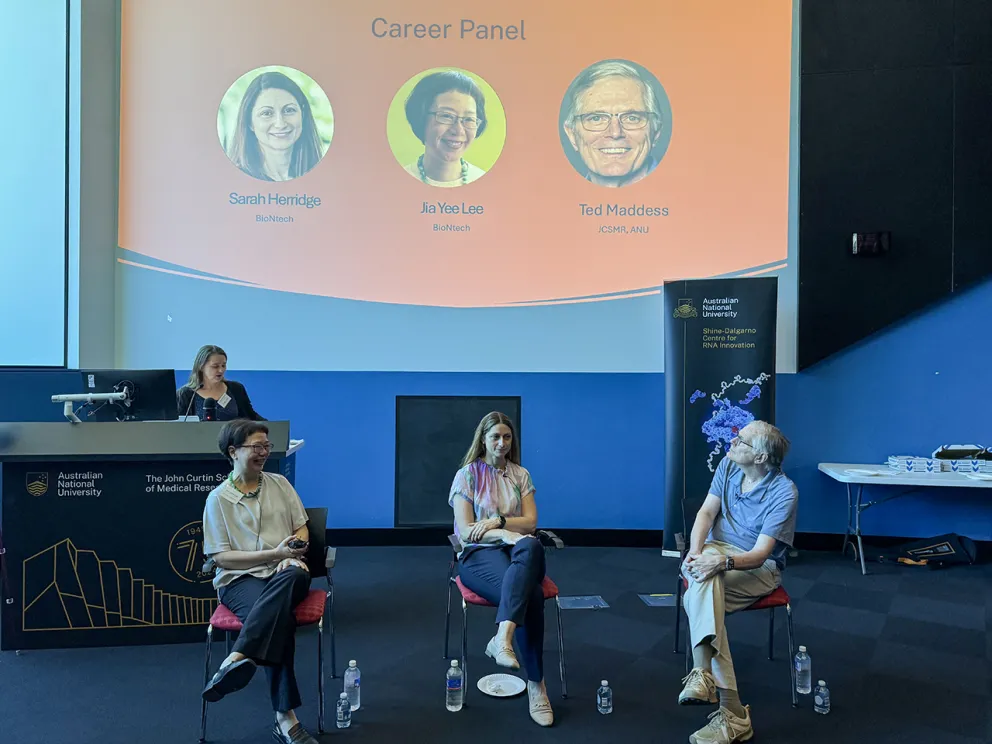From bench to beyond: exploring my path after the PhD

This student blog is written by Sasanan (Sand) Trakansuebkul, PhD student from the Fischer Group and winner of the 2024 ANU 3-Minute Thesis Competition.
“What do I want to do after my PhD?”
If you’re having this question, you’re not alone—it keeps looming in the back of my mind now that I’m nearing the end of my PhD.
My idea of a scientific career has always been focused on academia: PhD, postdoc, then group leader.
But recently, that vision has begun to change.
For the first time, I’m considering a different career pathway: teaching, science communication, industry, and even consulting.
To academia or not to academia
The sheer number of possibilities, though, is both a blessing and a curse. With many doors open, uncertainties creep in.
I feel lost. What if I pursue something I don’t like? Can I transition back to academia or switch to other sectors? How do I even start?
So, I did what many others before me did—I turned to my peers and started networking.
What began as a quick chat within my network turned into cold calling those at ANU and beyond.
I’ve talked to a marine biologist who pursued a degree in science communication, went into media, and eventually returned to academia to do science communication.
I’ve listened to researchers who followed the traditional academic track—from PhD to professor—then founded start-ups and moved into industry.
I’ve spoken to a lecturer-turned-business professional who eventually went into consulting.
I’ve met people who took on science communication roles right after their PhDs and thrived.
I’ve heard the story of a group leader who thought of quitting academia during their post-doc but stayed the course.
And I’ve known people who did it all—researching and teaching in academia while doing freelance consulting.
No two journeys are ever the same. It turns out that career paths are never an either-or question but an open-ended one.

No right path, only your path
So, what have I learned?
Firstly, career paths are diverse—some more linear, others more convoluted. That’s why talking to as many people as possible is invaluable.
LinkedIn is a great resource, and a short, polite message can open unexpected doors. Start with your immediate network, then branch out to speak to their mentors, students, and colleagues, and beyond.
Knowing what others have done and gone through—their struggles, their personal growth, what worked for them, and what didn’t—helps to rethink and reframe your own journey.
I'm beginning to see that mine is not a straight line. There are many crossroads, and while taking one path may feel like steering off your original goal, it can lead to unexpected opportunities that help you discover who you are and where you want to be.
Secondly, don’t be afraid to venture off the beaten path. It may feel a little scary, but it’s also freeing and exciting.
Some suggested pursuing another degree such as one in science communication or business. Note, however, that while one can study and read all the "how-to" guides, it's like driving a car—you only truly learn once you're out on the road.
That’s why many of the people I spoke to recommended internships. Not only does it provide insight into different careers, but it can also lead to job offers.
As PhD students, while we might feel we lack formal training in other fields, we already possess valuable transferable skills, such as problem-solving, critical analysis, time management, collaboration, and communication.
As such, we shall have the courage and confidence to embrace change.
Finding my way
After all this, you might ask me, "So, what do you really want to do?"
Through these conversations and explorations, I’ve realised one thing for sure: I want a career that allows me to keep learning, engage with people, and tell great stories about science.
Ideally, I’d love a role that integrates my passions for research, teaching, and science communication.
So yes, while I may not have all the details figured out yet, I now have the tools to actively shape my path toward that career.
If you're in the same position, my best advice is this: talk to people, seek out opportunities, and be brave to take a step in a new direction.
You might just find your next passion along the way—your way.
